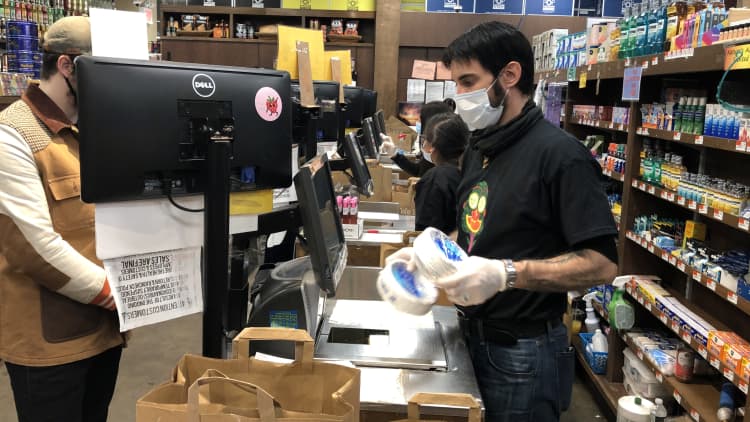Essential businesses are fortunate to remain open during the coronavirus pandemic, but keeping operations running during the crisis has come with a host of challenges.
Mo Issa is the owner of Brooklyn Fare, a chain of three grocery stores and a three-Michelin-starred restaurant in New York City. While all his businesses are deemed essential, Issa shut down his restaurant when Gov. Andrew Cuomo made his shelter-in-place announcement on March 20. Issa had to lay off nearly 60 employees.
Meanwhile, running his three grocery stores has been possible but extremely difficult. He says most of his days are spent trying to persuade scared employees to come to work, making sure the stores are supplied and keeping up with the surge in online sales.
"I had a gut feeling that things were going to change a little bit," Issa said. "I actually spoke to a couple of my managers. I told them to stock up a little bit more on dry goods. But to be very honest with you, not in my wildest dream did I think we'd go to this level."
Mo says while supply has dropped significantly due to labor disruptions, running the stores on nearly half the regular staff is his biggest challenge. "Every morning I just got to deal with it. I lose two. Three come back. I lose four, two come back. If this lasts a few months this is going to be very difficult, extremely difficult."
Changes in spending habits is one of the most immediate impacts of the pandemic. Data on credit card transactions indicate that spending has dropped in most categories except for groceries and alcohol. But for Jonathan Goldstein, who is the co-owner of Park Avenue Liquor Shop, located in midtown Manhattan, this has not been the case.
With no foot traffic and loss of all corporate business, Goldstein said the shop is down 75% to 80% in sales. "We have four to six weeks before we have to seriously look at the books and say, 'Is this worthwhile?'" Goldstein said. The shop has had to lay off 12 out of 20 staff members.
In late March, the government responded to the economic havoc brought on by the coronavirus with the biggest relief package in history. Of the $2 trillion approved, $349 billion was dedicated to small businesses.
However, within two weeks of the programs launching, the Small Business Administration announced that the money had run out and that they would no longer accept applications. According to a survey by The National Federation of Independent Business, as of April 17, 80% of applicants had not received any money. Lesley Covitz and Matt Fulton, owners of two restaurants in Brooklyn, New York, were among them.
"It's just really frustrating, because we really want to help our employees. Most of them live paycheck to paycheck, and without us who knows what's gonna happen to them," said Fulton.
Additional funding is now on the way. On Friday, President Donald Trump signed an interim coronavirus bill providing $484 billion in relief. Of that, $370 billion will be going to small businesses. It remains to be seen how this will affect the many small essential businesses who are hanging on by a thread.



